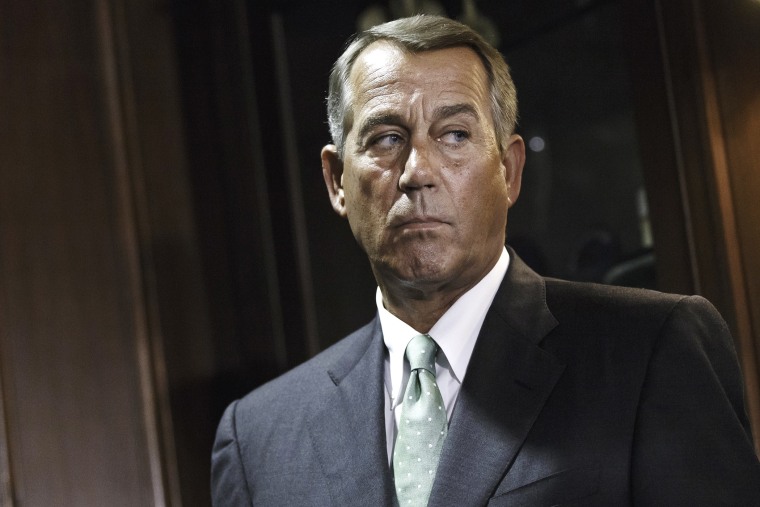In their zeal to oppose President Obama, House Republicans have several times come close to sabotaging the economy in recent years. But their planned lawsuit against the president may set a new standard for obstructionism.
The potential legal action, which got a hearing in the House Rules Committee Wednesday morning, stands little chance of success. But the very fact that it looks set to go forward makes the GOP’s current priorities clear.
To hear many Republicans tell it, Obama has routinely violated the Constitution through his executive actions. But the lawsuit is expected to zero in on the recent White House decision to delay the Affordable Care Act’s employer mandate for a year or two.
The GOP says the point is to establish the principle that the president can’t pick and choose how and when to enforce laws passed by Congress.
It’s about “protecting the Constitution,” Speaker John Boehner said last week. “The current president believes he has the power to make his own laws—at times even boasting about it.”
President Obama sees things differently. “Their big idea has been to sue me,” he said Tuesday. “That’s what they’re spending time on—a political stunt that wastes America’s time and taxpayer dollars.”
So far, it looks like Obama is winning the argument. A PPP poll released Tuesday found that 51% of respondents see the lawsuit as a "political stunt," while 41% see it as legitimate.
Helping Democrats make their case is the fact while Boehner and co. lay plans to take the president to court; they’ve approved almost no substantive legislation. Any remaining hope of passing comprehensive immigration reform, perhaps the most pressing item on lawmakers’ plates, seemed to die away this month.
And re-opening the Obamacare debate just when it had seemed to slip off the political radar might not do the GOP any favors. A poll last week found that even 74% of newly insured Republican voters like their coverage, while enrollment figures remain strong. On the campaign trail, many of the party’s candidates have lately been downplaying the issue.
It doesn’t help that, policy-wise, the lawsuit represents a major flip-flop. Conservatives staunchly opposed the employer mandate all along, with many casting it as an outrageous government intrusion into the private sector that would raise the cost of doing business. The White House decision to delay the mandate for businesses with 50-100 employees was in part a concession to concerns that some companies needed more time to adjust. Now, Republicans find themselves in the awkward position of suing for faster enforcement of a provision they’ve said they hate.
Legal experts say the merits of the case are dubious at best. For one thing, House Republicans would need to convince a court that they have “standing”—that is, they’ve suffered a specific, concrete harm from the delay of the employer mandate.
For another, it's routine for the executive branch to delay or tweak the enforcement of rules, as it looks to implement complex legislation. In 2006, President Bush delayed the enforcement of a mandate (yup) for seniors to sign up for Medicare’s prescription drug benefit. Congress didn’t raise a peep.
Of course, the real audience for the GOP’s gambit is its base of conservative voters and activists, who are desperate for another confrontation with the president. It’s no coincidence that plans for the lawsuit are advancing just as impeachment fever builds among many on the right. Boehner knows impeachment would be a disaster for the GOP, but he needs a way to keep tea party voters on the team, to ensure they’ll turn out this fall.
Indeed, it’s likely that a series of appeals could drag the case out for several years—meaning it might not even be resolved before Obama leaves office in 2017.
